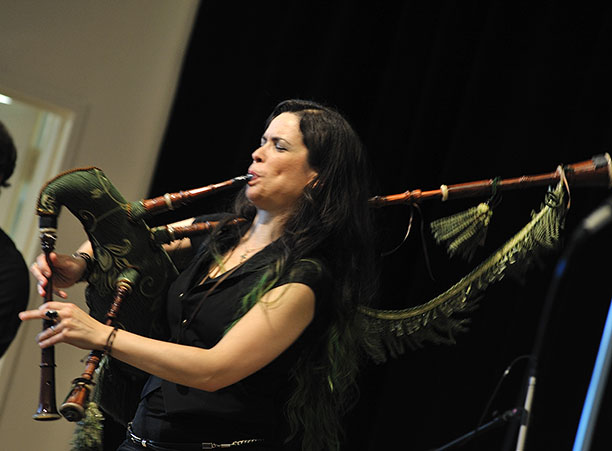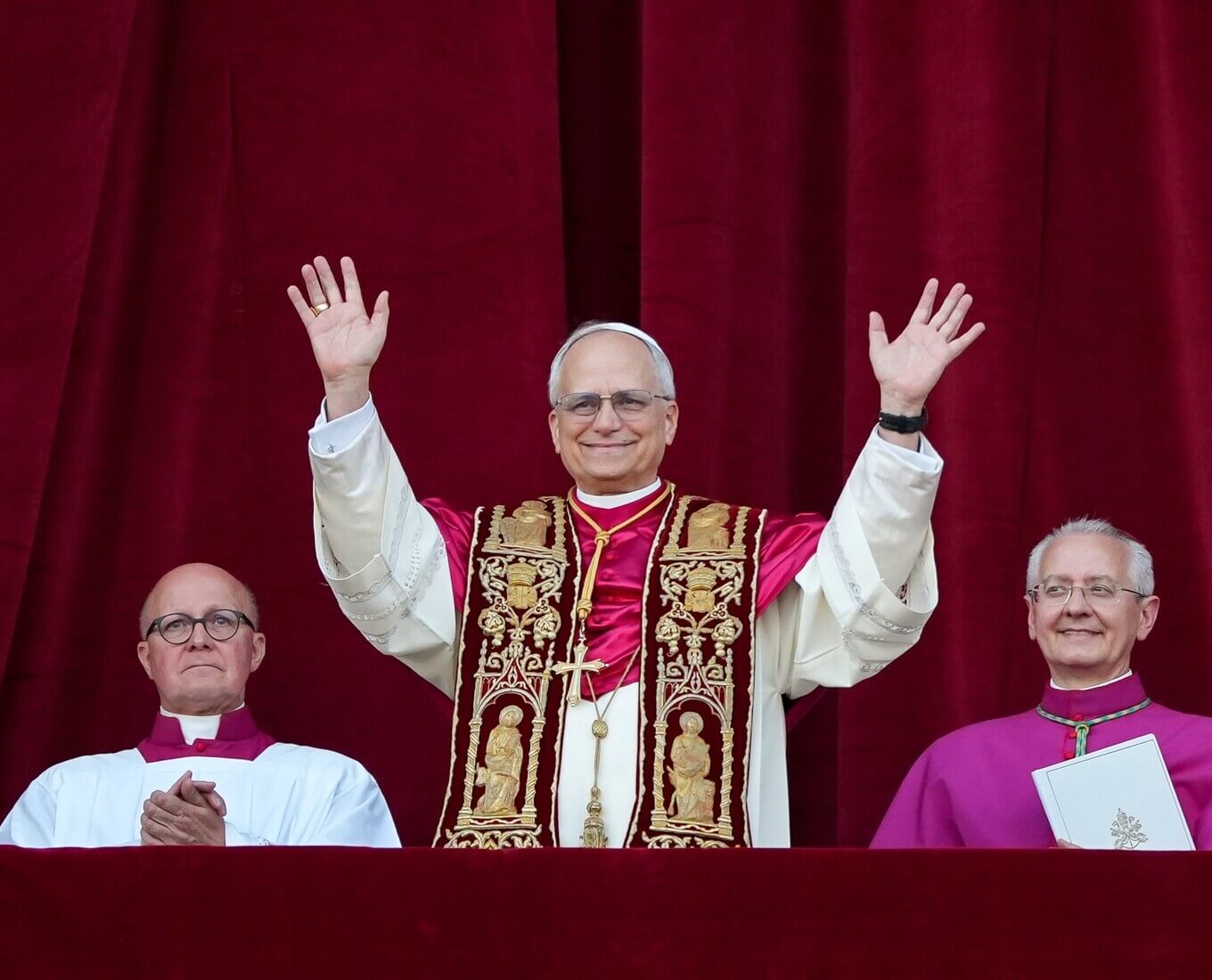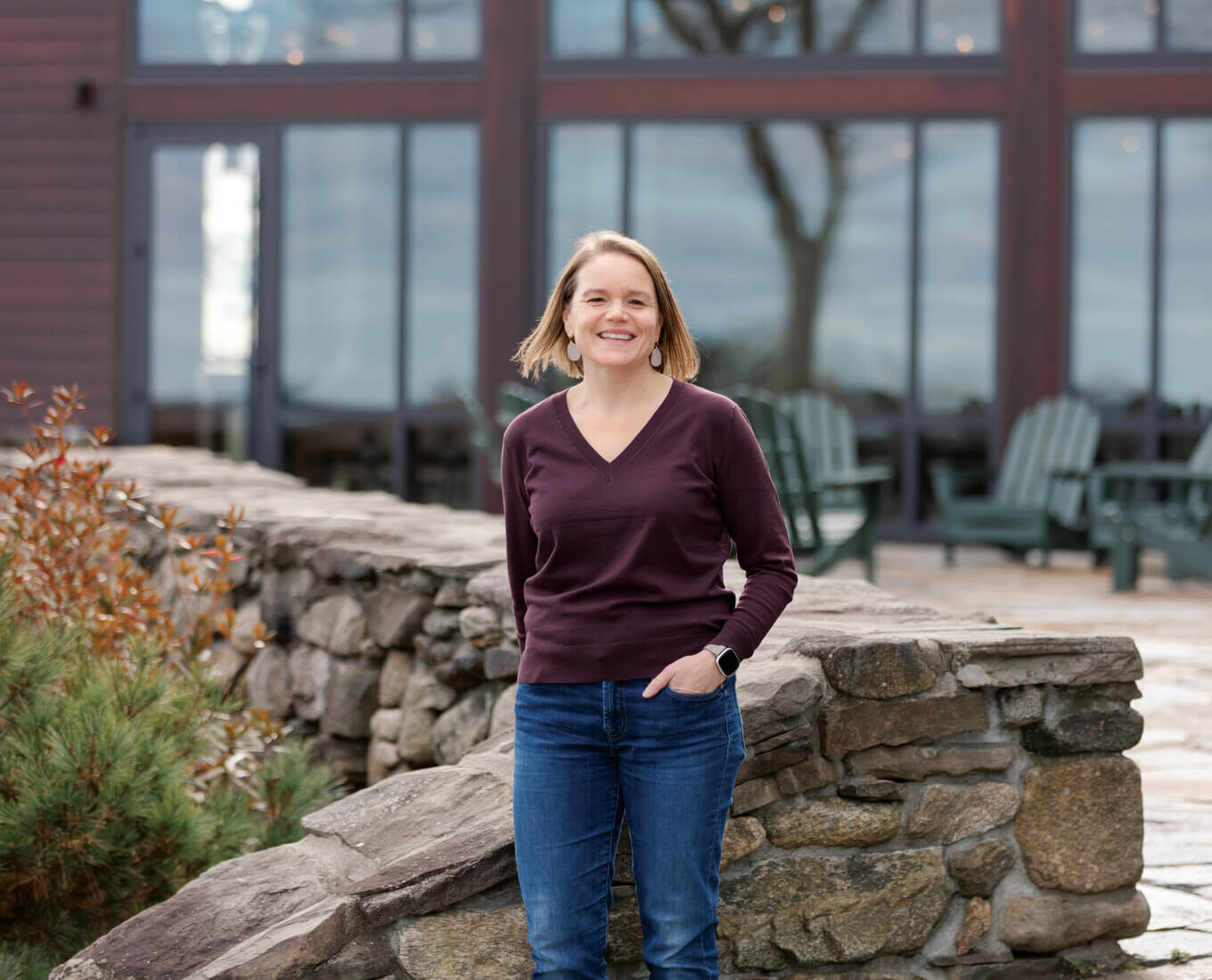Take eight faculty members from various disciplines—economics, sociology, psychology, music and theatre. Add 70 students with more than a dozen different majors. Bring in Cristina Pato, the Galician bagpipe “diva.” Set it in a renovated theatre space turned into a think tank or “incubator.” Born is the Creative Laboratory or “CreateLab,” an innovative pedagogical experiment, at the College of the Holy Cross.
The class stemmed from “Arts Transcending Borders,” a new initiative designed to infuse the fine and performing arts in students’ academic lives and create new opportunities throughout the curriculum and the community by transcending cultural, geographic and disciplinary boundaries. The initiative is funded by the Andrew W. Mellon Foundation.
“CreateLab is intended to engender imagination and innovation among students,” explains Lynn Kremer, professor of theatre and director of Arts Transcending Borders. “The goal of the program is to foster creativity outside the confines of disciplinary boundaries to enrich student learning and growth in all areas.”
Operating free from the constraints of a traditional classroom, students participating in CreateLab will work cooperatively to produce imaginative projects, which are designed to teach students to be risk-takers, use resourceful thinking and, most of all, collaborate on creative work.
“Building upon models fostered at a number of prominent colleges and universities, students will be challenged to think outside the box of conventional learning,” says Kremer. “The course is intended to complement the goals of the Arts Transcending Borders initiative, specifically the residency of Galician bagpiper, pianist, and composer Cristina Pato, a member of the famed Silk Road Ensemble.”
Artist-in-residence Pato will help introduce the 2014-15 theme of Arts Transcending Borders—“Time, Memory, and Identity” —with a concert and panel discussion (with CreateLab faculty) on Sept. 23.
A large team-taught class is a somewhat radical idea says Kremer. “Each faculty member is responsible for bringing 6-10 students from his or her discipline into the Lab. They will then mentor a team of students from across disciplines,” says Kremer.
Leah Hager Cohen, Distinguished Writer in Residence at the College, is one of the faculty members teaching in CreateLab. Says Cohen: “I hope students will experience this as an opportunity to take real risks: creative, intellectual, social, and most of all, the risk of giving oneself permission to dwell in the space of not-knowing—which I believe is the source of all creative work.”
Cohen explains the faculty in the class are working on “balancing the traditional task of imparting knowledge (delivering lectures, guiding activities, giving and evaluating assignments) with a more facilitating role - that is, at times stepping back and being there simply as resources for the students while they take responsibility, while they take the lead.”
She adds: “ The truth is, we're going to be asking a lot of the students: to own their goals and to play a large role in devising the road maps for reaching them.”
The class is not just for students majoring in the arts. Prebusiness, premedical and students from across the disciplines will l benefit, too. CreateLab faculty member David Chu, associate professor of economics and director of Entrepreneurial Studies and Pre-Business Advisor, says, “In their professional work after Holy Cross, students will need to know how to integrate seemingly disparate information in order to present their proposition in front of top management, investors, clients, and especially need to learn how to work in teams.”
Cecilia Wolfe ’15, a psychology major with a concentration in peace and conflict studies, who has enrolled in CreateLab, says “My work as a psychology major is informed by all of the other academic and co-curricular projects I invest time in, including event planning, lab work, creative writing, and theater. I think this class is a brilliant way to bring together students who would otherwise not have opportunities to work together and focus on a mutual interest in academic, artistic exploration.”
Most classes are being held in The Pit, located in the basement of O’Kane Hall. “It will serve as a ‘beehive’ space that will encourage cross-disciplinary enrichment and faculty and student interaction,” says Kremer. Additional faculty team members include Renee Beard (sociology and anthropology), Mark Freeman, (psychology), Osvaldo Golijov (music), Edward Isser (theatre), and Michael Beatty (visual arts), as well as guest faculty, artists and musicians, such as Marcus Santos, the Brazilian percussionist who promotes music as an educational resource.
“Now that I am a senior, I’ve had some experience in this type of open academic space, and my hope is to take bigger risks [in CreateLab],” says Wolfe. “Usually, I try to understand everything about a topic or idea before diving in, whereas this semester I want to push myself to immerse myself in projects and ambitions that may not have clear pathways or end goals. I've learned over the last three years, that is how true discovery and learning happens.”
Related Information
Innovative Classroom Experiment 'CreateLab' Takes Shape at Holy Cross
Team-taught by faculty across disciplines, students collaborate in creative 'incubator'
Read Time
4 Minutes


